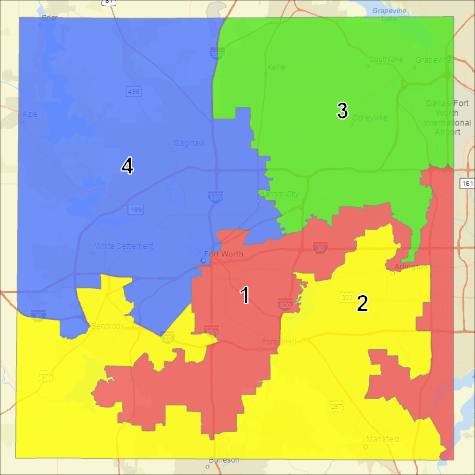July 2, 2025 Story by: Publisher
Tarrant County commissioners have approved a $250,000 contract with the Public Interest Legal Foundation (PILF) to defend the county’s recently adopted redistricting map against a lawsuit alleging racial gerrymandering.
The decision, made during a Commissioners Court meeting on June 3, 2025, passed with a 3-2 vote, aligning with the Republican majority. The lawsuit, filed by five residents on June 4, claims that the new map violates the Voting Rights Act and the 14th and 15th Amendments of the U.S. Constitution by diluting the voting power of communities of color.
The PILF, a conservative law firm, was previously selected by Republican County Judge Tim O’Hare to lead the redistricting process. Critics argue that hiring the same firm to defend the map creates a conflict of interest, a concern raised by Democratic Commissioner Alisa Simmons during the meeting. She questioned whether PILF attorneys might be called as witnesses in the lawsuit, potentially complicating their role in the defense. County Attorney Mark Kratovil acknowledged the concern but stated that any conflict would be addressed as the lawsuit progresses.

Photo caption: Option 7 of the Tarrant County redistricting maps. (Photo courtesy of Tarrant County)
Background of the Redistricting Effort
The redistricting process initiated by Tarrant County Republicans was unusual because it took place mid-decade, outside of the typical post-census cycle. The new map redraws the five commissioners court precincts with an explicit goal of creating an additional Republican-leaning district. This effort effectively increases the GOP’s hold on the commissioners court from three seats to four.
Opponents argue that the map packs predominantly Democratic and minority voters — particularly Black and Hispanic communities — into a single district, thereby diluting their political influence across the county. The lawsuit, filed on June 4, 2025, claims that this map violates Section 2 of the Voting Rights Act and the 14th and 15th Amendments by reducing the electoral power of communities of color.
Legal and Political Implications
The lawsuit, Jackson v. Tarrant County, could have significant consequences for how redistricting is conducted in Texas’s fast-growing urban counties. Texas has a complex history of voting rights litigation, especially in counties with large minority populations. Federal courts have repeatedly intervened in cases where maps were found to be racially discriminatory.
The PILF has a history of involvement in redistricting cases. In a previous case, the firm defended Galveston County’s redistricting map against allegations of racial discrimination. While a federal district court initially ruled the map was discriminatory, the 5th U.S. Circuit Court of Appeals later overturned that decision, underscoring the legal complexities in proving racial gerrymandering.
Broader Context
Tarrant County, home to Fort Worth, is one of Texas’s most populous counties with a population exceeding 2 million residents. Demographically, it has seen significant growth in its Hispanic and Black communities over the last decade. According to U.S. Census data from 2020, non-Hispanic White residents make up approximately 48% of the county’s population, while Hispanic or Latino residents account for about 29%, and Black or African American residents comprise roughly 14%.
Given these shifting demographics, redistricting has become a focal point for debates over political representation and voting equity. Critics of the new map argue that it undermines fair representation for the county’s increasingly diverse electorate.
Next Steps
As the legal challenge proceeds, the role of PILF as both the map creator and defender will be closely scrutinized. The case will test the limits of partisan redistricting practices under existing voting rights protections.
Tarrant County commissioners face increasing pressure from community advocates, civil rights groups, and some local leaders to reconsider or revise the map to better reflect the county’s demographic diversity and uphold equitable representation.
The outcome of Jackson v. Tarrant County could also set precedents affecting other Texas counties and the broader national debate over redistricting, gerrymandering, and minority voting rights.
Source: WFAA











![U.S. Attorney General Merrick Garland has announced that the Justice Department will be filing a lawsuit against Georgia’s election law, which introduces new restrictions on voting. [Ken Cedeno/Reuters]](https://blkpoliticsnow.com/wp-content/uploads/2024/10/ewterg-120x86.png)





